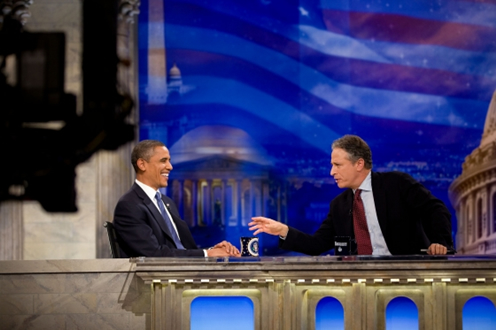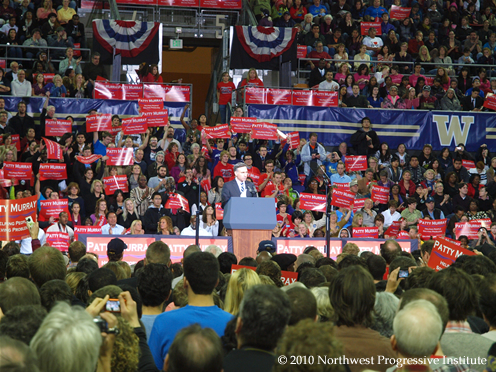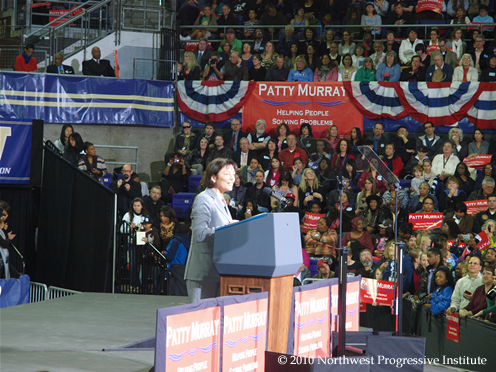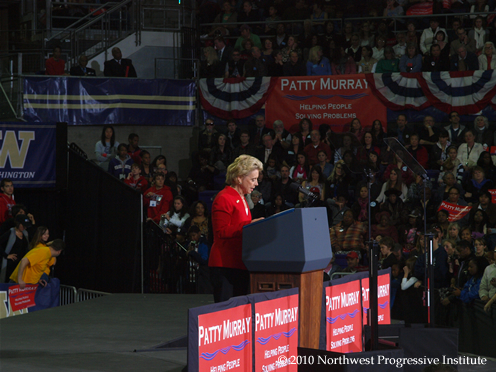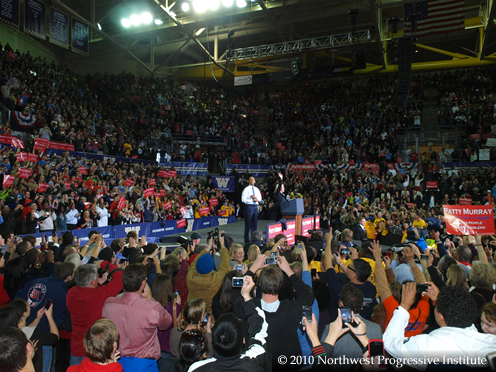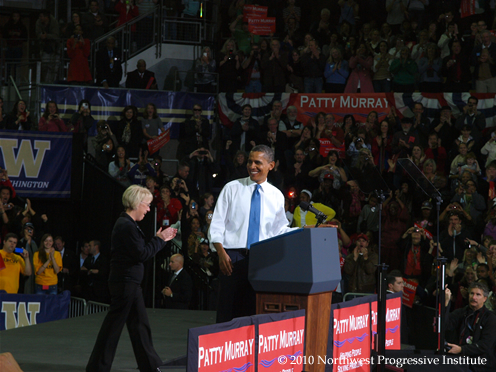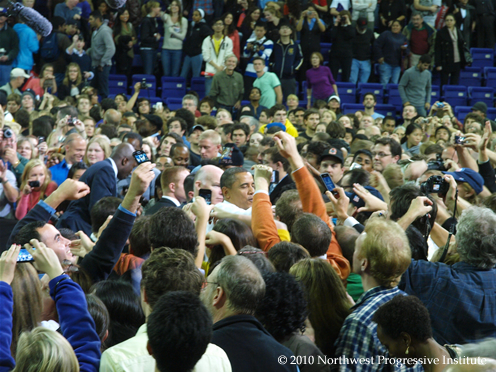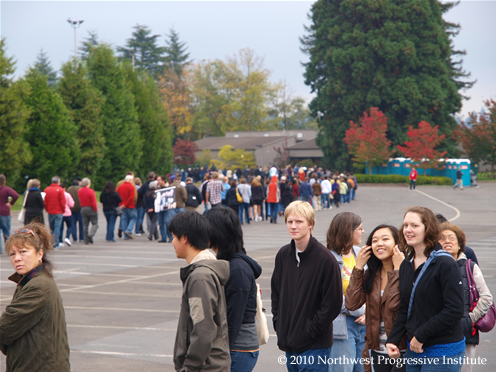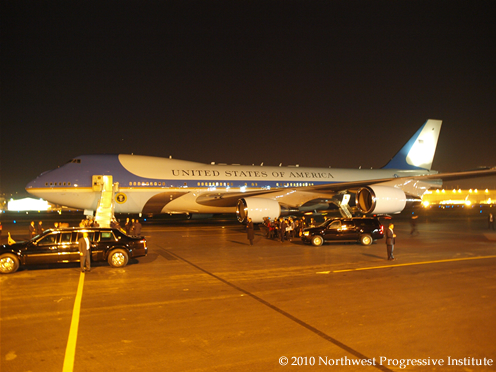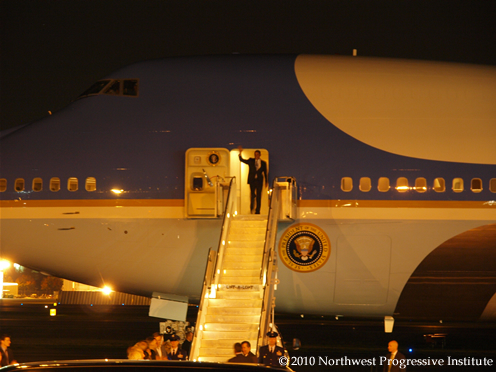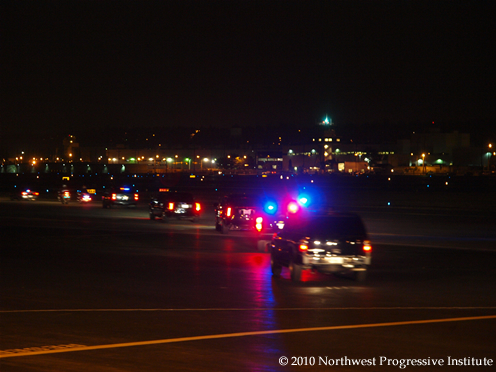Not long after Barack Obama's first visit to the Evergreen State as President (which occurred on August 17th) I penned a column for Reporter Newspapers calling on both Patty Murray and Dino Rossi to make themselves more accessible to voters, concluding that we would benefit from more retail politics and less stagecraft.
Part of what motivated me to write the column was the fact that the events the President did with Senator Murray weren't even open to the public or even to the press. You had to purchase access to be sure of getting in. The problem was, the minimum entry fee was too steep for many families to afford.
That led me to ask this question:
Why didn’t Murray’s campaign at least schedule a rally to balance out the fundraisers, which cost $500 or more to get into? That would have at least allowed more of Murray’s own volunteers and supporters to catch a glimpse of Barack Obama. And the President enjoys lifting people’s spirits at a rally. He did it many times while on the trail in 2008.
Coincidentally, only a few days after that column's publication, Patty Murray's campaign announced that the President was returning to the Evergreen State to headline a rally at the University of Washington.
I have no doubt that they were already in talks with the White House to make a second trip out here a reality before I wrote my column.
Regardless, it was pretty satisfying to log into my inbox one afternoon in late September and read the media advisory announcing the event.
The President certainly made the most of his second visit to Washington State.
Air Force landed last night at 9:22 PM, bearing down on Boeing Field from the north and making two one hundred and eighty degree turns before coming to a halt in front of the airport's passenger terminal. The President was greeted by Governor Chris Gregoire, Representatives Jim McDermott and Jay Inslee, and King County Executive Dow Constantine, among other Democrats. After talking with them in front of the Lift-a-Loft, the President briskly walked over to the welcoming party behind the metal barrier and shook hands.
His motorcade then departed to his hotel on northbound Interstate 5.
The President began his day today by making an unexpected visit to Top Pot Doughnuts at 9:21 AM, surprising and delighting patrons inside.
"Hey guys," the President said as he walked in, accompanied by Press Secretary Robert Gibbs, speechwriter Jon Favreau, Deputy Chief of Staff Jim Messina, and White House Trip Director Marvin Nicholson.
Cheers immediately broke out in the doughnut shop.
After shaking hands, the President stepped to the counter and ordered a couple dozen doughnuts for his staff. "I think we've gotta sample everything, right?" the President asked. "So why don't you just give us a sample," he instructed the clerk. "Whatever you recommend."
The President then went upstairs with Senator Patty Murray, and met a family from Virginia and a family from Maryland who were visiting Seattle (what are the odds?)
Returning downstairs, he paid for the doughnuts (leaving a generous tip), paused for a Kodak moment, and then sampled one of the doughnuts.
"This is outstanding," the President said. "You can't eat this every day."
He was gently corrected by one of the Top Pot employees, who explained that some Seattleites do, in fact, stop by daily.
At 9:34 AM the President's motorcade departed downtown. With its path cleared of traffic by Seattle police, it arrived at the Wedgwood home of Erik and Cynnie Foss only four minutes later. The route was lined by enthusiastic crowds, including students from a nearby school that had apparently emptied out entirely.
The Fosses gave the President a gift to take back with him for Malia and Sasha, and after speaking privately with the family for a few minutes, the President went out into the backyard for a discussion on women and the economy.
Eli Sanders of The Stranger and
Joel Connelly of the Seattle Post-Intelligencer attended and each have published thorough recaps, so I won't paraphrase the pool reports from the Fosses' backyard. The transcript is available on the White House's website for those who'd like to read the questions and answers themselves.
The President concluded his remarks shortly after 11 AM, having taken eight questions, and the motorcade was rolling at 11:18 AM. The journey to the University of Washington took seven minutes.
The President and Senator Murray opted to speak to the overflow crowd of about three thousand gathered inside of Husky Stadium first; the President jogged out of the tunnel with Murray and Secret Service agents at 11:36 AM.
Each spoke for a few minutes. Murray went first, then turned to Obama.
"Thank you, Huskies!," the President began. "It is great to see all of you. Look, I'm not going to give a long speech now because then you’ll be listening to two long speeches. I just wanted to — the main reason I wanted to come out, because I thought it would be cool to run through the tunnel."
The crowd laughed.
"I liked doing that. But I also wanted to come out and just say thank you to all of you, because there are a lot of you who worked on our campaign, there are a lot of you who voted, some for the very first time, because you realized that we're at a crossroads in history right now. America is the greatest country on Earth, but we didn’t get here because it was preordained."
"We got here because our parents and our grandparents and our great grandparents, they were all willing to roll up their sleeves and work — to work on behalf of freedom, to work on behalf of opportunity."
"I've been inspired by you because, wherever I go, traveling across this country, especially when I meet young people, I am reminded of your energy and your drive and your imagination," the President added later. "And for all the problems we're going through right now, we still have the best workers on Earth, we've got the finest universities on Earth, we've got the best entrepreneurs on Earth. We've got the freest, most vibrant economy on Earth..."
"[And the] best President on Earth!" somebody shouted.
"Well, I won't say that," the President said as the crowd applauded, "but we've got a pretty good President," he joked.
"I am here to deliver one simple message: If you have not voted yet, you’ve got to get that ballot and put it in the mail. Don't delay. Do it right after this rally. You’ve got to, then talk to your friends. You’ve got to talk to your neighbors. You’ve got to make phone calls. You’ve got to knock on doors."
"You have to make sure that you are as fired up and as excited now as you were two years ago -- because the work is not yet done. And I have to have Patty Murray back in the United States Senate."
At 11:47 AM, the President finished speaking and headed into Hec Edmundson Pavilion itself. Less than a couple minutes after Governor Chris Gregoire finished speaking, he and Murray walked into the arena, which simply vibrated with thunderous applause and cheers.
The noise did not abate one iota for several minutes.
At last, however, Murray was able to speak. She began by challenging pundits and cynics to leave the D.C. bubble, come to Washington State, and see for themselves that Democrats are fired up.
She proceeded to defend her record in the U.S. Senate, saying she was proud of her votes to hold Wall Street accountable, expand healthcare coverage to more Americans, and force banks out of the student loan business.
She described Obama as a "great president", eliciting sustained cheers and applause from the crowd, which behaved as if in the presence of a rock star.
And she reminded activists of her own humble upbringing.
"When I was a teenager, my dad was diagnosed with multiple sclerosis. He spent much of his life in a wheelchair," Murray said.
"It was a very tough time for my family. He lost his job, and I was just about to go on to college, and I was really worried that I wouldn't be able to do it," Murray recounted. "But my parents never gave in and they never gave up. And with the help of our country, which was at our backs, with Pell grants and student loans, they managed to send all seven of their kids to college."
"Even though they had to cut their budget and make tough choices every day, they believed in investing in their family's future. And today, because they looked to the future, because this country was at our back, all seven kids [are working and have good jobs]."
She described herself and her siblings as "a firefighter... a lawyer... a computer programmer at Microsoft... a sports writer... a mom staying at home taking care of her kids... a middle school teacher... and a United States Senator!"
Turning her attention to Dino Rossi, she declared, "I think we deserve better than a one-word answer to every problem. We deserve better than Di-NO!"
Taking another swipe at her challenger, she added, "My opponent wants to go back to the three R's — and those aren't the three R's that you learn here at the UW. His three R's are repeal, rewind, and retreat... Mr President, I think we've got several thousand people here who don't agree with that!"
At 12:15 PM, Murray concluded her remarks and embraced the President, who stepped forward to another deafening roar of applause.
"I am thrilled to be back in Seattle," the President told the crowd.
After recognizing state and local leaders, he explained, "When this state sent Patty to the Senate, she wasn’t one of those lifelong politicians who wanted the job for the fancy title or the nice office. She was the mom in tennis shoes, who was just looking to help a few people and solve a few problems. All these years later, that’s exactly what she has done."
"And Washington — Washington, you know Patty Murray. You know what she’s made of. You’ve seen her go to bat to keep Boeing jobs and aerospace jobs right here in Washington. You’ve seen her fight for clean energy jobs and new infrastructure jobs. You’ve seen her fight to make sure that this nation keeps faith with our veterans because it is a sacred trust."
The President urged rallygoers to get out the vote, noting, "There are a lot of folks out there in Washington, D.C. — not in Washington state, but in Washington, D.C. — who are saying, you know what, it can’t be done, just like they said in 2008. You can’t — what they’re saying is — what they’re saying is that you can’t say no to the special interests, that you can’t overcome the cynicism in politics."
"Yes we can!" the audience shouted.
"That you can’t overcome the millions of dollars in negative ads."
"Yes we can!" the audience shouted.
"That you can’t elect a black guy with a funny name, Barack Obama."
"Yes we can!" the audience shouted. (Some shouted, "Yes we did!")
"They’re always telling us what we cannot do, and you just keep on coming back and saying, yes, we can," the President declared.
After assailing the policies of the Bush error, which led to the financial meltdown of 2008 and the Great Recession, the President offered an analogy that has become a staple of his stump speeches around America. (Many of you reading have probably heard this one before).
"The Republicans took America’s car and drove it into the ditch," the President began. "And it was a really deep ditch. And it was really reckless driving. So Patty and I show up at the — we show up at the scene of the accident. The Republicans have climbed out of the car, abandoned the accident. Patty and I, we’re putting on our boots, and we go down and into the ditch, and it’s muddy down there, and it’s hot, and it’s dusty. But you know what, we know we’ve got to get the car out, so we just start pushing."
"And Patty, even though she’s small, she’s tough, so she’s pushing hard. She’s pushing. And even though I’m skinny, I’m pretty tough, so I’m pushing."
Rallyogers laughed heartily.
"And sometimes our feet slip a little bit, and sometimes it’s not budging, but we’re just staying on it, and we’re sweating. And every once in a while we look up, and the Republicans are up there on the road, they’re just waving. They’re going around whispering to everybody, 'They’re not pushing hard enough. They’re not pushing the right way.'"
"And we say to them, 'Well, why don’t you come down here and help push?' 'No, no, no, no. But push harder, push harder.'"
"So we just go ahead and push. And finally, finally, we get this car up on the road —finally. The car is a little banged up... it’s got to go the body shop. We need to get a tune-up. But you know what, it’s pointing in the right direction. It’s ready to move. And suddenly, we get this tap on our shoulders, and we look back. Who is it? It’s the Republicans. And they say, "We want the keys back.'"
The President paused for dramatic effect, then concluded in a booming voice, "And you can’t have the keys back. You don’t know how to drive."
The crowd roared.
"I want Patty Murray driving the car. The Republicans can ride with us, but they’ve got to be in the backseat... where they can’t do too much damage."
The President concluded his address by reflecting on the struggles of progressives throughout American history, reminding activists that change is never easy. It's hard. It's slow going. In an era of instant gratification, we don't want to wait, but things that are worth doing usually took time.
It took time for past generations of liberty-loving liberals to persuade their fellow colonists to break away from England, and to end slavery, and to expand suffrage to women, blacks, and and young people.
Likewise, it will take us time to restore America. We can't get discouraged.
"Don’t ever let anybody tell you that this fight is not worth it. Don’t let them tell you that you’re not making a difference," Barack Obama said.
"The journey we began together was not about putting a president in the White House. It was about building a movement for change that endures," the President added. (We at NPI couldn't agree more).
"That’s what Patty Murray believes. That’s what I believe. And if that’s what you believe, I need you to knock on doors, and make phone calls, and talk to your friends and talk to your neighbors. And if you do that, I promise you, not only will we win this election, but we will restore the dream for the next generation."
After shaking hands with the lucky few standing directly behind the metal barricades that encircled the stage, the President departed. His motorcade sped to Boeing Field and within a half hour, Air Force One was lifting off for San Francisco.

